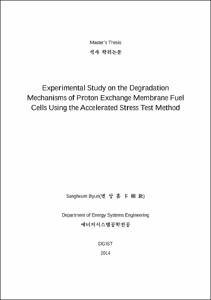Experimental Study on the Degradation Mechanisms of Proton Exchange Membrane Fuel Cells Using the Accelerated Stress Test Method
- Title
- Experimental Study on the Degradation Mechanisms of Proton Exchange Membrane Fuel Cells Using the Accelerated Stress Test Method
- Alternative Title
- 가속스트레스시험 방법을 이용한 고분자전해질 연료전지의 열화 기작에 관한 실험적 연구
- Author(s)
- Byun, Sang Heum
- DGIST Authors
- Byun, Sang Heum ; Han, Byung Chan
- Advisor
- Han, Byung Chan
- Co-Advisor(s)
- Yoon, Young Gi
- Issued Date
- 2014
- Awarded Date
- 2014. 8
- Type
- Thesis
- Subject
- AST ; Limiting current density ; Degradation ; Durability ; PEMFC ; 가속스트레스시험 ; 한계전류밀도 ; 열화 ; 내구성 ; 고분자전해질 연료전지
- Abstract
-
Long-term durability of a Polymer Electrolyte Membrane Fuel Cell (PEMFC) is the main bottleneck to a wide-scale of commercialization for the power sources of various devices. Over the last several decades focused researches have been conducted to investigate its mechanism but still isolated facts and mechanisms have been found. In this thesis, in-situ electrochemical measurements and scanning electron microscope (SEM) which belongs to ex-situ measurement were conducted to investigate the systematic analysis for degradation mechanisms of PEMFC
under three modes of Accelerated Stress Test (AST)methods. The objectives of the thesis are to determine the causes of degradations and mechanisms by identifying microstructural changes in the PEMFC especially in MEA. To achieve the goals, we made the MEA and prepare other components of PEMFC to setup the PEMFC single cell system. Three different modes of AST were applied to study degradation behaviors in fast time. Polarization curve,
high frequency resistance (HFR) and cyclic voltammetry (CV) were conducted to estimate the changes of performance of cell which indicates the whole reaction rate of single cell, the contacts between the components of MEA and electrochemical surface area (ECSA) which indicates the active Pt surface area. Activation overvoltage and the Tafel slope take a role to identify degradation mechanism related to characteristics of Pt. Limiting current density and contribution of mass transport overvoltage feeding low concentration reactants show the direct trends of mass transport of reactants. Our results indicate that the collapse of carbon support and the subsequent local environment which surrounds carbon support is the major factors controlling the long-term durability of a PEMFC at AST on carbon support materials. Contact loss of ionomer with support and catalyst degradation simultaneously occur at AST on catalyst
materials. With relatively high temperature and low relative humidity (RH) conditions, pinhole formations may be the reason of membrane/ionomer degradation. ⓒ 2014 DGIST
- Table Of Contents
-
Chapter1. Introduction 1 --
1.1 Introduction to PEM fuel cells 1 --
1.2 Objective of thesis 5 --
Chapter2. Experimental 6 --
2.1 Preparation of MEA & components 6 --
2.2 Electrochemical measurements 6 --
2.3 Accelerated stress tests 7 --
2.4 Structural characterization of MEAs by SEM 9 --
Chapter3. Results and discussion 10 --
3.1 Microstructural changes of MEA using AST on catalyst materials 10 --
3.2 Microstructural changes of MEA using AST on support materials 16 --
3.3 Microstructural changes of MEA using AST on membrane/ionomer materials 22 --
3.4 Integrated discussions 28 --
Chapter4. Conclusions 34 --
References 36 --
Summary (국문요약) 39
- URI
-
http://dgist.dcollection.net/jsp/common/DcLoOrgPer.jsp?sItemId=000002262510
http://hdl.handle.net/20.500.11750/1373
- Degree
- Master
- Department
- Energy Systems Engineering
- Publisher
- DGIST
- Files in This Item:
-
 기타 데이터 / 996.94 kB / Adobe PDF
download
기타 데이터 / 996.94 kB / Adobe PDF
download
- Appears in Collections:
- Department of Energy Science and Engineering Theses Master



